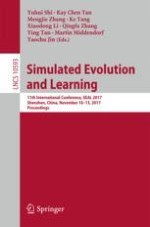2017 | OriginalPaper | Buchkapitel
A Fast Objective Reduction Algorithm Based on Dominance Structure for Many Objective Optimization
verfasst von : Fangqing Gu, Hai-Lin Liu, Yiu-ming Cheung
Erschienen in: Simulated Evolution and Learning
Aktivieren Sie unsere intelligente Suche, um passende Fachinhalte oder Patente zu finden.
Wählen Sie Textabschnitte aus um mit Künstlicher Intelligenz passenden Patente zu finden. powered by
Markieren Sie Textabschnitte, um KI-gestützt weitere passende Inhalte zu finden. powered by
